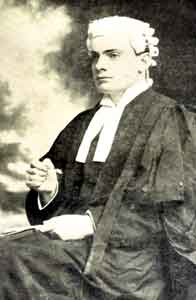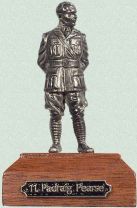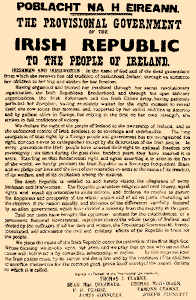|
|
|


Patrick PEARSE (1879 -1916) Padriag Pearse the Lawyer The year 1879 saw the birth of Patrick Henry Pearse. Patrick was not only intelligent but hard working, and won a scholarship to the Royal University where he studied law and became a lawyer then a barrister.  Padriag Pearse His love of Ireland and its language led him to devote himself to the revival of the Irish Language and to educational reform. Initially he regarded this as more important than political independence. In 1908 he established an independent Irish-speaking school for boys in Dublin, called St. Enda’s. Its pupils were to "work hard … for their fatherland, and if it should ever be necessary … die for it". As a member of the Irish Volunteer Force at its foundation in November 1913 his leadership qualities became apparent and he gained rapid promotion to its headquarters staff . He was an eloquent speaker and spoke well of the need for an Independent Ireland.  Padriag Pearse Stamp In May 1915 he was made a member of the IRB Military Council which was planning the Easter Uprising. Pearse played an active role in the subsequent preparations: arranging for the landing of German arms; negotiating with Connolly; instructing and sending despatches to the volunteers; lulling the British authorities and deceiving Eoin MacNeill. He also wrote copiously to justify and explain the insurrection. On 23rd April, the Military Council appointed him Commandant-General of the Army of the Irish Republic and President of the Provisional Government to be proclaimed next day.  Proclamation The chief objectives of the 1916 rebellion were the attainment of political freedom and the establishment of an Irish republic. Centuries of discontent, marked by numerous rebellions, preceded the uprising. The new crisis began to develop in September 1914, following the outbreak of World War I, when the British government suspended the recently enacted Home Rule Bill, which guaranteed a measure of political autonomy to Ireland. Suspension of the bill stimulated the growth of the Citizen Army, an illegal force of Dublin citizens organised by the labour leader Jim Larkin (died 1948) and the socialist James Connolly (1870-1916); of the Irish Volunteers, a national defence body; and of the Sinn Féin. During Easter week Patrick Pearse served at the rebellion headquarters, the GPO, in Collins Street, Dublin, where he was in titular command only. It is unlikely that he fired a single shot. Rather, he exuded a calm confidence and imparted encouragement to his men. He interpreted his role as that of offering encouragement, addressing the men to sustain morale and occasionally also the public. The pivotal point was the reading of the Proclamation on Easter Monday. Privately, he agonised over the moral rightness of what they had undertaken. He foresaw defeat stating: "When we are all wiped out, people will blame us. …In a few years they will see the meaning of what we tried to do." As fire swept the Post Office on 28th April, he helped organise its evacuation and was amongst the last to leave. At noon next day, he accepted the majority view of the leadership that they negotiate with British troops to prevent further slaughter of civilians and save the lives of their followers. At 2:30 pm he surrendered unconditionally on behalf of the Volunteers and later issued orders to this effect. Patrick Pearse was court-martialled at Richmond Barracks on 2nd May. At his trial he pleaded that the lives of the men should be spared and he himself executed. He was found guilty, sentenced to death and was transferred to Kilmainham Gaol that evening. There he completed his correspondence, further explaining and justifying the Rising.  Arbor Hill Cemetery He became, through his writings and the offices he held during Easter week, its incarnation, icon and public image. He wrote to his mother ‘This is the death I should have asked for if God had given me the choice of all deaths’, thus comforting her as best he could. Patrick Pearse faced the firing squad with a brave heart, at between 3:30-4:00 am, on the 3rd May, 1916 and was buried at Arbour Hill Barracks alongside Thomas Clarke and Thomas MacDonagh who had also been executed that day. It takes a special kind of faith to die for what you believe in, not seeing or knowing whether it will ultimately be achieved. (Last poem, written on the eve of his execution (May 2, 1916))
The beauty of the world hath made me sad,  The Seven Signatories All of the seven signatories were executed by the British Government for their efforts in trying to secure a free Ireland! May we Never Forget Their Sacrifice |
